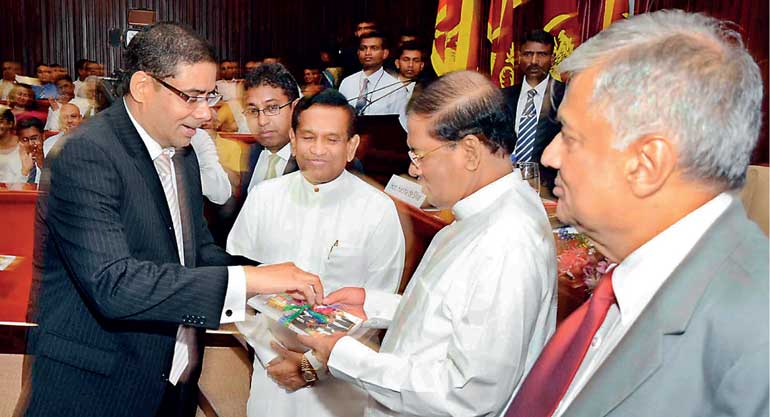Friday Feb 20, 2026
Friday Feb 20, 2026
Thursday, 24 December 2015 00:00 - - {{hitsCtrl.values.hits}}

Author Dinesh Weerakkody presents his book ‘The Great November Revolution’ to President Maithripala Sirisena at its launch held at the BMICH. Prime Minister Ranil Wickremesinghe, Health Minister Rajitha Senaratne and Deputy Foreign Minister Harsha de Silva look on - File photo
Che Guevara’s son and daughter were the honoured guests at a seminar at the Tehran University in July 2007. The organisers of the event called themselves “the internationalist wing of the Iranian Islamic students’ movement.”
The main speaker welcomed the offspring of the iconic revolutionary leader and declared that the “martyr” Che was an internationalist. He would have been their comrade in arms in the streets of Tehran had he been alive. He then pronounced that ‘Che’ was in fact a “godly man” who finally met God.
Che’s daughter Aleida walked to the podium. Throwing aside her prepared speech, she angrily insisted “I don’t know what book you are quoting from. My father was a communist who did not believe in God and as far as I know, never met God in the end either!”
The two Guevara offspring were escorted straight to the Tehran Airport.
The Great November Revolution
I was reminded of this episode when reading the “Great November Revolution” by Dinesh Weerakkody. The book is a UNP insider’s account of the political change that occurred in January 2015. The author is a former Chairman of Commercial Bank PLC. According to the brief on the back cover, he is “currently serving in several roles in an honorary capacity in the present Government.”
It is a narrative of events from the inner sanctums of the grand old party, leading up to the Presidential Elections of January 2015. It is also a painstakingly adulatory account of the role of Ranil Wickremesinghe in steering the UNP to support the common candidacy of Maithripala Sirisena. It derives its authority from the proximity of the author to some of the principal actors who supported the common candidate at different stages.
But the title is a misnomer. By no stretch of the imagination could that be construed as a revolution. A revolution is a radical rejection of the status quo.
Just as comrade Che never had his tryst in the heavens, what occurred on 15 January was not a revolution, great, modest or minor.
To call it a revolution is to confuse the forest with the trees. If allowed to pass unchallenged, this misinterpretation can only lead us to greater despair than what we already experience in the form of ingenious reinterpretations of nepotism, cronyism and inelegant elitism.
Throughout his treatise, the author of the ‘Great November Revolution’ has ignored the common Marxist maxim that “political power is precisely the official expression of antagonism in civil society.”
The truth, however, is that a little bit of Marxism can remove the wool that blurs the vision of those who attempt to romanticise the election of Maithripala Sirisena to the presidency. Here, one must pay heed to Marx’s challenge to the unofficial class that claims political relevance – peerage by birth right, wealth by inheritance etc.
“Actual extremes cannot be mediated with each other precisely because they are actual extremes. But neither are they in need of mediation, because they are opposed in essence.”
Seeking the levers of power
Dinesh Weerakkody deserves praise for his plain dealing with some contemporary political realities. Politics it is said is the business of men seeking the levers of power. Obviously the author Dinesh Weerakkody, is himself, conversant with the search for and the exercise of the levers of power. Opposing Mahinda Rajapaksa was not easy for him. He is trapped in history and history too is trapped in him. I borrow the phrase from James Baldwin in ‘Strangers in the Village’.
“ I was faced with the dilemma of leveraging the displacement of MR who had not obstructed my election to office as Chairman of Commercial Bank (given the sizable chunk of Government shareholding in it), whereas the then Governor of the Central Bank of Sri Lanka was trying his best to oust me in favour of his nominee. On the other hand, averting a potential dictatorship had become a necessity, given the arrogance of some of the members in the Government ...”
The author should be congratulated for his insight into the workings of the oligarchy that was entrenched in the Rajapaksa dispensation. That he, himself, was a willing player in the firmament is conceded with great élan.
Here is Lenin praising the Tsar and blaming the courtiers of the Romanov dynasty.
The writer has a disarming style of recording gossipy details. At times some valid historical conclusions can be extracted from gossip. Here’s an instance of big capital exerting its weight behind good governance.
“I had just finished watching TV when my mobile rang. It was business tycoon Harry Jayawardena calling to ask how many had joined or were joining? I told Harry J, according to what I heard, it would be around 21. Who are they he asked? I said I did not know, because I was not sure how secure the line was.”
History records that German Chancellor Bethmaan Hollweg of the Frankfurt Banking family facilitated Lenin’s return from exile in Zurich. Great revolution indeed!
What happened on 8 January
Dinesh Weerakkody devotes an entire chapter to the title ‘Ranil the statesman’. He writes: “To date, I don’t really know who convinced Ranil to agree to field Maithri as the Oppositions’ candidate.”
“ ... Previously, there had been talk of a common candidate, where names such as Ven. Sobhitha Thero had been touted, but there was no inkling that Ranil then, was going to withdraw from the race. Fortunately, in the case of Ranil, saner counsel prevailed, all due to his statesmanship-like approach to this situation. Otherwise, who knows, Sri Lanka’s history might have been deferent.”
It seems that the installation of Ranil Wickremesinghe as Prime Minister has changed Sri Lanka’s history. Perhaps it is an allusion to the remark of Marx that revolutions are the locomotives of history. Levity aside, it is time for us to take stock of the delicious muddle we are in.
We are a nation that is trapped in that uncertain space between ‘no longer’ and ‘not yet’. It is vital that we understand what happened on 8 January. A fortuitous combination of circumstances dislodged Mahinda Rajapaksa from the presidency.
It was a civic initiative that succeeded. It immobilised an institutionalised autocracy. It was a freak confluence of an overwhelming majority of the minority communities of Tamils and Muslims with a grudging concession by an evenly split Sinhala majority community.
The political genius of Mahinda Rajapaksa was his effortless success in enlisting the mob and the elite in a protean political project – shapeless but consistent in purpose. It enlisted diverse people.
The academic fellow of ‘All Souls College’ in Oxford and the street smart fellow dubbed ‘Raththaran’ for his propensity to snatch gold chains were both enlisted in holding aloft the ‘big lie’ – the imminent threat of a resurgent LTTE.
This status quo remains. The 8 January change has not dismantled the great leader project of Mahinda Rajapaksa.
Challenging the notion of revolution
Dinesh Weerakkody is the paradigmatic operative of the new oligarchy that is thriving in post-war Sri Lanka. His notion of ‘revolution’ should not be allowed into the current discourse without a challenge. Historical revolutions persist in societal memory because they are driven by the kind of ideas that resonate long after the events.
What the UNP fails to recognise, even to this day, is the revolution that occurred in 1956. The current battle for the ‘spiritual essence’ of the SLFP between Maithri and Mahinda fails to penetrate the UNP psyche.
1956 made the UNP a dinosaur. That explains why the UNP decided to opt for the common candidacy of Maithripala Sirisena. Mahinda Rajapaksa called the snap election, secure in the belief that he was running against UNP’s Ranil Wickremesinghe. Indeed the UNP defeated the SLFP-led alliances in 1965 and 1977. Ranil did lose the Presidency in 2005 by a whisker. Yet, the UNP in the public psyche is the party of unearned advantages, the party of privileges and the party of oppression.
The changes that occurred in 1956 were permanent. After a revolution, people start to use new eyes. They hear with new ears. They think new thoughts. They refuse to subscribe to old prejudices and old ignorance. That happened in 1956. It did not happen in 2015.
Prime Minster Ranil Wickremesinghe has not learnt the lessons of 1956. The lesson of that great revolution of 1956 was that people realised that power is not something that some people have and some people don’t have. Power is distributed throughout society. It determines all social relationships. When he says that the UNP Executive Committee has more knowledgeable diplomats than the Ministry of External Affairs, he deprives the people of their power. His elitism is an affront to our commonsense.
To his credit Mahinda Rajapaksa has convinced a near 50% of the people that they were never deprived of their power during his decade in office. Even the author Dinesh Weerakkody has conceded his dilemma over Mahinda Rajapaksa. It was just his bad luck that he had a brother who reared sharks as a hobby.